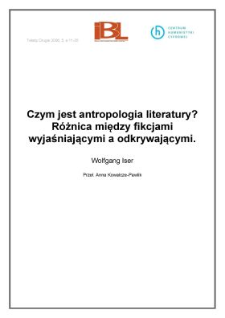- Search in all Repository
- Literature and maps
- Archeology
- Mills database
- Natural sciences
Advanced search
Advanced search
Advanced search
Advanced search
Advanced search

Object
Title: Czym jest antropologia literatury? Różnica między fikcjami wyjaśniającymi a odkrywającymi
Subtitle:
Contributor:
Publisher:
Place of publishing:
Description:
21 cm ; Tekst pol., streszcz. ang.
Type of object:
References:
1. F. Bacon, The Advancement of Learning and New Atlantis, red. Thomas Case, Oxford University Press, Londyn: 1974, s. 96.
2. C. Castoriadis, The Imaginary Institution of Society, przeł. K. Blamey, Polity Press, Cambridge 1987.
3. H.-G. Gadamer, Prawda i metoda. Zarys hermeneutyki filozoficznej, przeł. B. Baran, PWH, Warszawa 2004, s. 161-162.
4. E. Gans, The End of Culture: Toward a Generative Anthropology, University of California Press, Berkeley 1985, s. 103 i n.
5. E. Gans, Originary Thinking: Elements of Generative Anthropology, Stanford University Press, Stanford: 1993, s. 117-219.
6. C. Geertz, Interpretacja kultur. Wybrane eseje, przeł. M.M. Piechaczek, Wydawnictwo Uniwersytetu Jagiellońskiego, Kraków 2005, s. 19.
7. A. Gehlen, Der Mensch. Seine Natur und seine Stellung in der Welt, Athenaeum, Bonn 1958, s. 21, 35, 89, 383.
8. M. Heidegger, Drogi lasu, przeł. J. Gierasimiuk i in., Warszawa 1997, s. 44.
9. W. Iser, The Fictive and the Imaginary: Charting Literary Anthropology, John Hopkins University Press, Baltimore 1993, s. 7-21.
10. W. Iser, The Range of Interpretation, Columbia University Press, New York 2000.
11. W. Iser, Staging as an Anthropological Category, „New Literary History” 1992 nr 23, s. 877-88.
12. W. Iser, What is Literary Anthropology? The Difference between Explanatory and Exploratory Fictions, w: Revenge of the Aestetic. The Place of Literature in Theory Today, red. M. Clarc, University of California Press, Berkeley 2000.
13. A. Leroi-Gourhan, Gesture and Speech, przeł. [ang.] A. Bostock Berger, MIT Press Cambridge, Mass. 1993, s. 76-83, 85, 88-89, 137.
14. J.M. Lotman, Aufsätze zur Theorie und Methodologie der Literatur und Kultur, red. i przeł. [ang.] K. Eimermacher, Scriptor, Kronberg 1974, s. 413.
15. E. Mayr, Toward a New Philosophy of Biology, Cambridge, Mass.: Harvard University Press, Belknap Press 1988, s. 34-35.
16. W. Pater, Appreciations with an Essay on Style, Macmillan, London 1920, s. 241.
17. W. Pater, The Renaissance: Studies in Art and Poetry, Macmillan, London 1919, s. 49.
18. W.R. Paulson, The Noise of Culture: Literary Texts in a World of Information, Cornell University Press, Ithaca 1988, s. 140.
19. P. Ricoeur, Freud and Philosophy: an Essay in Interpretation, przeł. D. Savage, Yale University Press, New Haven: 1970, s. 497-98, 514 i n.
20. F.J. Varela, Principles of Biological Autonomy, North Holland, New York, 1979, s. 86-91.
21. N. Wiener, The Human Use of Human Beings, Doubleday Garden City, N.Y., 1954, s. 33.
Relation:
Issue:
Start page:
End page:
Detailed Resource Type:
Format:
Resource Identifier:
oai:rcin.org.pl:51722 ; 0867-0633
Source:
IBL PAN, call no. P.I.2524 ; click here to follow the link
Language:
Language of abstract:
Rights:
Rights Reserved - Restricted Access
Terms of use:
Digitizing institution:
Institute of Literary Research of the Polish Academy of Sciences
Original in:
Library of the Institute of Literary Research PAS
Projects co-financed by:
Programme Innovative Economy, 2010-2014, Priority Axis 2. R&D infrastructure ; European Union. European Regional Development Fund
Access:
Object collections:
- Digital Repository of Scientific Institutes > Partners' collections > Institute of Literary Research PAS > Serials
- Digital Repository of Scientific Institutes > Literature > Journals/Articles
Last modified:
Oct 2, 2020
In our library since:
Feb 17, 2015
Number of object content downloads / hits:
766
All available object's versions:
https://rcin.org.pl./publication/68074
Show description in RDF format:
Show description in RDFa format:
Show description in OAI-PMH format:
| Edition name | Date |
|---|---|
| Iser W. - Czym jest antropologia literatury? Różnica między fikcjami wyjaśniającymi a odkrywającymi | Oct 2, 2020 |
Objects Similar
Nycz, Ryszard
Łebkowska, Anna

 INSTYTUT ARCHEOLOGII I ETNOLOGII POLSKIEJ AKADEMII NAUK
INSTYTUT ARCHEOLOGII I ETNOLOGII POLSKIEJ AKADEMII NAUK
 INSTYTUT BADAŃ LITERACKICH POLSKIEJ AKADEMII NAUK
INSTYTUT BADAŃ LITERACKICH POLSKIEJ AKADEMII NAUK
 INSTYTUT BADAWCZY LEŚNICTWA
INSTYTUT BADAWCZY LEŚNICTWA
 INSTYTUT BIOLOGII DOŚWIADCZALNEJ IM. MARCELEGO NENCKIEGO POLSKIEJ AKADEMII NAUK
INSTYTUT BIOLOGII DOŚWIADCZALNEJ IM. MARCELEGO NENCKIEGO POLSKIEJ AKADEMII NAUK
 INSTYTUT BIOLOGII SSAKÓW POLSKIEJ AKADEMII NAUK
INSTYTUT BIOLOGII SSAKÓW POLSKIEJ AKADEMII NAUK
 INSTYTUT CHEMII FIZYCZNEJ PAN
INSTYTUT CHEMII FIZYCZNEJ PAN
 INSTYTUT CHEMII ORGANICZNEJ PAN
INSTYTUT CHEMII ORGANICZNEJ PAN
 INSTYTUT FILOZOFII I SOCJOLOGII PAN
INSTYTUT FILOZOFII I SOCJOLOGII PAN
 INSTYTUT GEOGRAFII I PRZESTRZENNEGO ZAGOSPODAROWANIA PAN
INSTYTUT GEOGRAFII I PRZESTRZENNEGO ZAGOSPODAROWANIA PAN
 INSTYTUT HISTORII im. TADEUSZA MANTEUFFLA POLSKIEJ AKADEMII NAUK
INSTYTUT HISTORII im. TADEUSZA MANTEUFFLA POLSKIEJ AKADEMII NAUK
 INSTYTUT JĘZYKA POLSKIEGO POLSKIEJ AKADEMII NAUK
INSTYTUT JĘZYKA POLSKIEGO POLSKIEJ AKADEMII NAUK
 INSTYTUT MATEMATYCZNY PAN
INSTYTUT MATEMATYCZNY PAN
 INSTYTUT MEDYCYNY DOŚWIADCZALNEJ I KLINICZNEJ IM.MIROSŁAWA MOSSAKOWSKIEGO POLSKIEJ AKADEMII NAUK
INSTYTUT MEDYCYNY DOŚWIADCZALNEJ I KLINICZNEJ IM.MIROSŁAWA MOSSAKOWSKIEGO POLSKIEJ AKADEMII NAUK
 INSTYTUT PODSTAWOWYCH PROBLEMÓW TECHNIKI PAN
INSTYTUT PODSTAWOWYCH PROBLEMÓW TECHNIKI PAN
 INSTYTUT SLAWISTYKI PAN
INSTYTUT SLAWISTYKI PAN
 SIEĆ BADAWCZA ŁUKASIEWICZ - INSTYTUT TECHNOLOGII MATERIAŁÓW ELEKTRONICZNYCH
SIEĆ BADAWCZA ŁUKASIEWICZ - INSTYTUT TECHNOLOGII MATERIAŁÓW ELEKTRONICZNYCH
 MUZEUM I INSTYTUT ZOOLOGII POLSKIEJ AKADEMII NAUK
MUZEUM I INSTYTUT ZOOLOGII POLSKIEJ AKADEMII NAUK
 INSTYTUT BADAŃ SYSTEMOWYCH PAN
INSTYTUT BADAŃ SYSTEMOWYCH PAN
 INSTYTUT BOTANIKI IM. WŁADYSŁAWA SZAFERA POLSKIEJ AKADEMII NAUK
INSTYTUT BOTANIKI IM. WŁADYSŁAWA SZAFERA POLSKIEJ AKADEMII NAUK


































